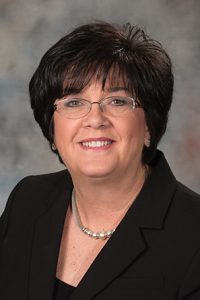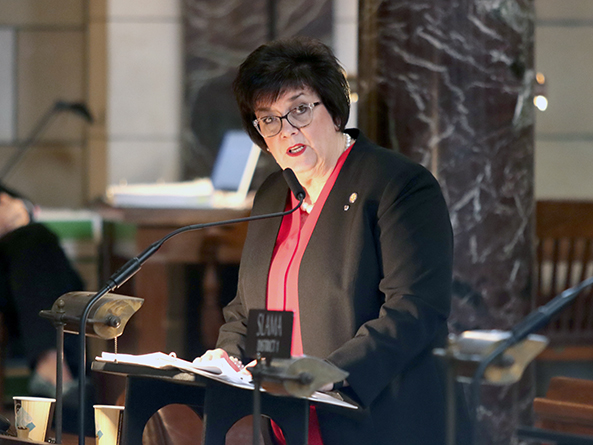Abortion ban ‘trigger’ bill stalls on first round
A bill that would ban all abortions in Nebraska if states are given full regulatory authority over the procedure stalled on general file April 6 after an unsuccessful cloture motion.

LB933, introduced by Thurston Sen. Joni Albrecht, would become operative contingent upon one of the three national “triggering” events: if the U.S. Supreme Court overturns Roe v. Wade, Congress enacts a law giving states complete authority to regulate abortion or the U.S. Constitution is amended to give states that authority.
The bill would prohibit both medical and chemical abortions starting at fertilization with no exception for cases of rape or incest. A physician who knowingly violates the bill’s provisions would be subject to a Class IIA felony charge, which carries a maximum penalty of 20 years imprisonment.
A physician charged under the bill’s provisions could claim an affirmative defense that the procedure was necessary to prevent a woman’s death. A woman who attempts or has an abortion would not be liable under the bill. Medical treatment provided by a licensed physician that results in accidental death or injury of an unborn fetus also would not be a violation.
Albrecht said that since the 1973 Supreme Court ruling in Roe v. Wade, approximately 200,000 abortions have been reported in Nebraska — a number equal to approximately 10 percent of the state’s population.
“Life is a human right,” she said. “It is often said that our greatest resource in Nebraska is our people. LB933 is about ensuring our most precious and vulnerable people — the pre-born — [are protected] from the violence of abortion.”
Sen. Mike Hilgers of Lincoln spoke in support of the bill. He said the Supreme Court’s ruling in 1973 removed the ability for voters and elected representatives to weigh in on the abortion issue. A ruling expected from the court in June could overturn Roe v. Wade, however, once again returning the policy question to the states, he said, and Nebraska should be ready.
“I stand with the supporters of science … that these babies are individual, unique people that are deserving of protection even if they happen to not have been born yet,” Hilgers said. “We stand with those who have no voice.”
Also in support was Sen. Michael Flood of Norfolk. In 2011, the Legislature passed a bill that prohibited abortions after 20 weeks gestational age, he said, yet no doctor has been charged with violating that law. The same exceptions that were provided for in the 20-week abortion bill — such as the provision allowing procedures that involve saving a mother’s life — also are included in LB933, he said.
“Nebraska is a pro-life state,” Flood said. “We pass laws that protect the sanctity of each life.”
Sen. Rita Sanders of Bellevue agreed, saying that pregnancy centers outnumber abortion clinics in Nebraska by an 8 to 1 ratio. The centers offer a wide array of free services to women such as counseling, support and supplies, she said.
“When someone claims that supporters of LB933 don’t care about mother or baby after birth, I respectfully disagree,” Sanders said. “Nebraska was ranked 11th in family-friendliness in having a baby and … there are many amazing resources available to pregnant women.”
Omaha Sen. Megan Hunt filed a motion to indefinitely postpone LB933, which would end consideration of the bill for the session. With so many issues yet to be addressed by lawmakers, she said, the bill would derail other important work. The motion failed on a 13-28 vote.
Speaking against the bill, Hunt said decisions about whether to become a parent and when are some of the most important that a person can make. Reproductive rights should not be up for debate, she said, and once someone makes the decision to end a pregnancy, their care should be safe, affordable and free from punishment or judgment.
“This policing of our bodies is something we should be concerned about for the direction of our culture in our country,” Hunt said, adding that LB933 would not end abortion, but would only make it more dangerous.
Lincoln Sen. Anna Wishart also opposed the measure. Globally, nearly 1 in 3 women will experience physical or sexual violence in their lifetime, she said, and the bill would take a “sledgehammer” to women’s freedom.
“I believe that women have the right to their bodies,” she said. “This legislation, while it may claim to be pro-life … makes Nebraska dangerous to live in as a woman.”
Omaha Sen. Machaela Cavanaugh expressed concern that the bill not only would create a felony charge for medical providers who violate its provisions, but also would change the scope of medical practice in the state.
“I have some very significant concerns about how this is going to affect our medical community and our ability to recruit and retain quality doctors [in] our state,” Cavanaugh said.
Several senators expressed concern that the bill would make no exception for cases of rape or incest. In response, Albrecht said that in 2020, there was one case of incest and 14 cases of sexual assault that resulted in pregnancy reported in Nebraska. One violent act does not justify another, she said.
Omaha Sen. Jen Day, speaking in opposition to LB933, said victims of incest and sexual assault should not be minimized by lawmakers.
“We cannot offer help to [them] because we are putting the rights of an embryo over a living, breathing human regardless of the circumstances in which a woman was impregnated,” Day said. “At what point do we see the humanity of the woman as less [important] than the pregnancy she is carrying?”
After eight hours of debate, Albrecht filed a motion to invoke cloture, which ends debate and forces a vote on the bill and any pending amendments. The motion failed on a vote of 31-15. Thirty-three votes were needed. The bill is unlikely to be placed on the agenda again this session.


